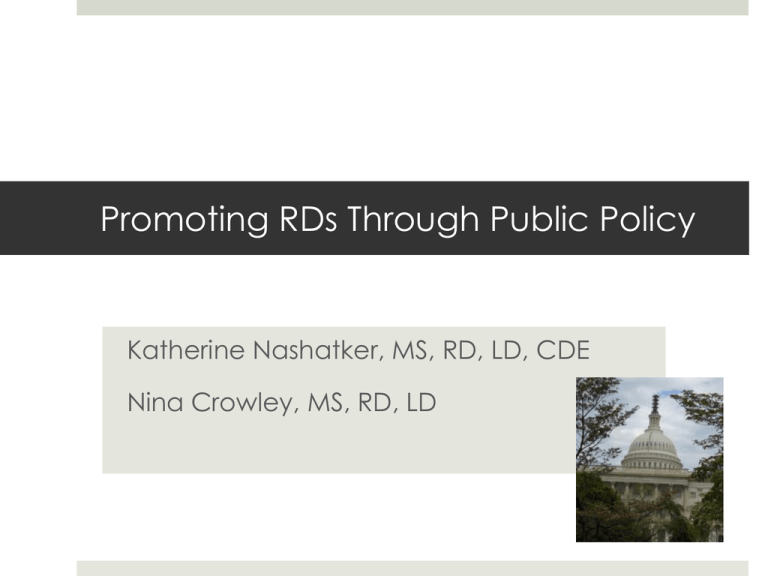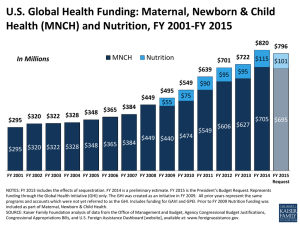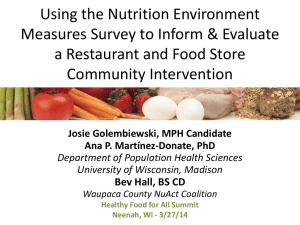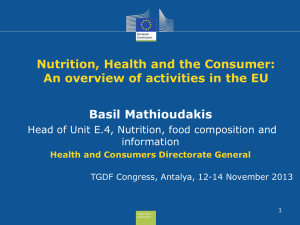Promoting RDs Through Public Policy
advertisement

Promoting RDs Through Public Policy Katherine Nashatker, MS, RD, LD, CDE Nina Crowley, MS, RD, LD Public Policy Workshop 2012 Washington, DC Be Aware Know who your lawmakers are, visit the Academy’s Action Center Federal Senate (6 yrs) State Senate (4 yrs ), House (2 yrs) Members Public Policy Legislation OR Take Action Find information about your lawmakers on their websites, or your state General Assembly website. www.scstatehouse.gov Know the political calendar and how often each office is up for election SC General Assembly's annual session begins on the 2nd Tuesday in January and runs through the 1st Thursday in June Know party platform positions on health care issues, visit The American Presidency Project www.presidency.ucsb.edu/pla tforms.php US Senators for SC • Jim DeMint (R) • Lindsey Graham (R) US Representatives for SC • 1st District -Tim Scott (R) • 2nd District -Joe Wilson (R) • 3rd District- Jeff Duncan (R) • 4th District- Trey Gowdy (R) • 5th District- Mick Mulvaney (R) • 6th District- James Clyburn (D) State Senators & Representatives 46 State Senators 26 Republicans 19 Democrats 1 vacancy 124 Representatives 76 Republicans 48 Democrats Speaker of the House – Bobby Harrell Look at committees legislators are involved in – some that have to do with medical issues Academy Public Policy Priority Areas Members Public Policy Legislative and Public Policy Priority Areas Consumer and Community Issues Prevention and treatment of chronic disease, including health care equity Meeting nutrition needs through the life cycle: Maternal and child nutrition to healthy aging Quality food and nutrition through education, production, access and delivery Nutrition monitoring and research Professional Issues Licensure: Protection of the Public Workforce demand: Assuring the Public has access to nutrition services delivered by qualified practitioners Outcome driven nutrition services in changing health systems Academy Resources On the Pulse A weekly report on topics that reflect the Academy’s legislative and regulatory priorities in Washington and the states, as well as reimbursement, science and practice-related matters Action Alert Action Alerts are sent to all members requesting them to contact their state representatives in order to bring awareness on pending legislation www.eatright.org/advocacy for more public policy info Older Americans Act Reauthorization: OAA of 1965 Congregate Nutrition Services (Title III) Home-Delivered Meal Services (Title III) Target: >60 years, low-income and homebound Results: 92 million meals, 1.7 million seniors served (63% rely on home-delivered meals for half or more of their total daily intake) South Carolina: annual cost of meals: $1,107 compared to annual cost of a nursing home stay: $25,000-$37,000 The Farm Bill (aka “The Food Bill”) The Commodity Supplemental Food Program (CSFP) The Emergency Food Assistance Program (TEFAP) The Supplemental Nutrition Assistance Program (SNAP) eligibility, program access, benefits levels & (SNAP-Ed) 40.3 million people in 18.6 million households “The economic return of nutrition education far exceeds the cost, with a return investment of $9.58 in health care and productivity savings for every $1 spent” Expanding MNT for Pre-diabetes General Population 1 in 10 people have DM, 4 out of 10 have pre-diabetes (annual cost to healthcare: $174 billion) Incidence in Medicare 7 out of 10 are affected by DM or pre-diabetes For 5 out of the 10, DM may be prevented if access to diet and exercise lifestyle interventions is provided New bill would increase scope of MNT provided to beneficiary with pre-diabetes, in addition to with diabetes. Drug Shortages Affecting Patient Care The Drug Shortage Prevention Act “critical drug” list, public alerts, revise FDA approval process Preserving Access to Life-Saving Medications Act 6 month notice required of any planned interruption Penalty: $10,000/violation not to exceed $1.8 million Require manufactures to submit notice to FDA for: Adjustments related to supply of raw materials Adjustments to production capabilities Business decisions that may affect manufacturer of the drug Announce Be able to explain what you know to others Provide clients with the facts supporting advocacy for RD services “The Academy of Nutrition and Dietetics National Coverage Determination Formal Request,” by Prashanthi Rao Raman, Esq, MPH, and Erica Gradwell, MS, RD, in the January 2012, volume 112, issue 1 of the Journal of the Academy of Nutrition and Dietetics Presents evidence from over 20 scientific studies demonstrating the health benefits and cost effectiveness of medical nutrition therapy. Contact your legislator, share who you are, what you do, and why it matters to them Invite legislators to local dietetic membership meetings, outreach activities, and/or sponsored events Get Active Respond to Action Alerts on Grassroots Manager on the Academy website www.eatright.org/members/actioncenter.aspx Attend townhall meetings Contribute to a political party As a registered dietitian, offer to serve as a subject expert for your legislator, in public policy or health advice Offer to volunteer during a legislator’s campaign, or hold a fundraiser (if you are not a government employee), the more local a candidate, the more low-key the fundraising events—don’t be intimidated! If legislators vote the way you request, thank them Attend State Dietetic Association Legislative Day and Academy Public Policy Workshop (March 10-12, 2013 in Washington DC) Meet with your Legislator To prepare for a visit watch the video “Removing the Fear Factor” produced by Lisa Eaton Wright, MS, RD, LDN http://vimeo.com/40030612 Bring handouts to support your message: “Top 10 Reasons How Registered Dietitians Can Improve the Health of Americans and Save Health Care Dollars” http://www.eatright.org/WorkArea/linkit.aspx?LinkIdentifier=id&ItemID=1 0795 “MNT Coverage for Medicare and Prediabetes” http://www.eatright.org/WorkArea/linkit.aspx?LinkIdentifier=id&ItemID=6 442468706&libID=6442468688 Bring your business card and write the Bill Number on the back of the card to encourage co-sponsorship Learning to be a Passionate Advocate Basic RULES of Politics Registered voter who is a passionate advocate Understand the process Loyalty to the Academy and some insight into political parties Electronic media use Support the Academy’s Public Policy Priority Areas Tips Read the local newspaper Get on the party’s email list ($25), if you give $50 you have to write down your profession – Dietitian! Choose a political party to join (only 1 during a 2 year election cycle) Contribute $25+ to a political party (but not both parties) Get on legislators website, facebook/twitter pages, newsletters and attend townhall meetings











